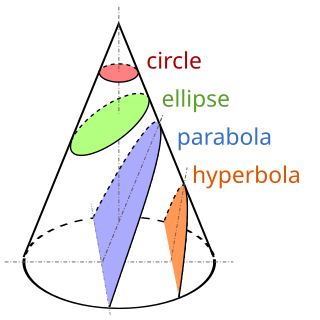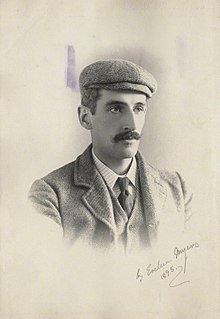
Euclid, sometimes called Euclid of Alexandria to distinguish him from Euclid of Megara, was a Greek mathematician, often referred to as the "founder of geometry" or the "father of geometry". He was active in Alexandria during the reign of Ptolemy I. His Elements is one of the most influential works in the history of mathematics, serving as the main textbook for teaching mathematics from the time of its publication until the late 19th or early 20th century. In the Elements, Euclid deduced the theorems of what is now called Euclidean geometry from a small set of axioms. Euclid also wrote works on perspective, conic sections, spherical geometry, number theory, and mathematical rigour.

Apollonius of Tyana was a Greek Neopythagorean philosopher from the town of Tyana in the Roman province of Cappadocia in Anatolia. He is the subject of Life of Apollonius of Tyana, written by Philostratus over a century after his death.
Philostratus or Lucius Flavius Philostratus, called "the Athenian", was a Greek sophist of the Roman imperial period. His father was a minor sophist of the same name. He was born probably around 170, and is said by the Suda to have been living in the reign of emperor Philip the Arab (244–249). His death possibly occurred in Tyre c. 250 AD.
The History of the Britons is a purported history of the indigenous British (Brittonic) people that was written around 828 and survives in numerous recensions that date from after the 11th century. The Historia Brittonum is commonly attributed to Nennius, as some recensions have a preface written in his name. Some experts have dismissed the Nennian preface as a late forgery, arguing that the work was actually an anonymous compilation.

Sir Thomas Little Heath was a British civil servant, mathematician, classical scholar, historian of ancient Greek mathematics, translator, and mountaineer. He was educated at Clifton College. Heath translated works of Euclid of Alexandria, Apollonius of Perga, Aristarchus of Samos, and Archimedes of Syracuse into English.

Apollonius of Perga was an Ancient Greek geometer and astronomer known for his work on conic sections. Beginning from the contributions of Euclid and Archimedes on the topic, he brought them to the state prior to the invention of analytic geometry. His definitions of the terms ellipse, parabola, and hyperbola are the ones in use today. Gottfried Wilhelm Leibniz stated “He who understands Archimedes and Apollonius will admire less the achievements of the foremost men of later times.”
Apollonius of Rhodes was an ancient Greek author, best known for the Argonautica, an epic poem about Jason and the Argonauts and their quest for the Golden Fleece. The poem is one of the few extant examples of the epic genre and it was both innovative and influential, providing Ptolemaic Egypt with a "cultural mnemonic" or national "archive of images", and offering the Latin poets Virgil and Gaius Valerius Flaccus a model for their own epics. His other poems, which survive only in small fragments, concerned the beginnings or foundations of cities, such as Alexandria and Cnidus places of interest to the Ptolemies, whom he served as a scholar and librarian at the Library of Alexandria. A literary dispute with Callimachus, another Alexandrian librarian/poet, is a topic much discussed by modern scholars since it is thought to give some insight into their poetry, although there is very little evidence that there ever was such a dispute between the two men. In fact almost nothing at all is known about Apollonius and even his connection with Rhodes is a matter for speculation. Once considered a mere imitator of Homer, and therefore a failure as a poet, his reputation has been enhanced by recent studies, with an emphasis on the special characteristics of Hellenistic poets as scholarly heirs of a long literary tradition writing at a unique time in history.

Greek mathematics refers to mathematics texts and ideas stemming from the Archaic through the Hellenistic and Roman periods, mostly extant from the 7th century BC to the 4th century AD, around the shores of the Eastern Mediterranean. Greek mathematicians lived in cities spread over the entire Eastern Mediterranean from Italy to North Africa but were united by Greek culture and the Greek language. The word "mathematics" itself derives from the Ancient Greek: μάθημα, romanized: máthēmaAttic Greek: [má.tʰɛː.ma]Koine Greek: [ˈma.θi.ma], meaning "subject of instruction". The study of mathematics for its own sake and the use of generalized mathematical theories and proofs is an important difference between Greek mathematics and those of preceding civilizations.
Paradoxography is a genre of Classical literature which deals with the occurrence of abnormal or inexplicable phenomena of the natural or human worlds.

Jordanus, distinguished as Jordan of Severac or Jordan of Catalonia, was a Catalan Dominican missionary and explorer in Asia known for his Mirabilia Descripta describing the marvels of the East. He was the first bishop of the Roman Catholic Diocese of Quilon, the first Roman Catholic diocese in India.
Apollonius of Tyre is the subject of an ancient short novella, popular in the Middle Ages. Existing in numerous forms in many languages, the text is thought to be translated from an ancient Greek manuscript, now lost.
Idomeneus of Lampsacus was a friend and disciple of Epicurus.

Francesco Maurolico was a mathematician and astronomer from Sicily. He made contributions to the fields of geometry, optics, conics, mechanics, music, and astronomy. He edited the works of classical authors including Archimedes, Apollonius, Autolycus, Theodosius and Serenus. He also composed his own unique treatises on mathematics and mathematical science.

Frederick Cornwallis Conybeare, was a British orientalist, Fellow of University College, Oxford, and Professor of Theology at the University of Oxford.

The Argonautica is a Greek epic poem written by Apollonius Rhodius in the 3rd century BC. The only surviving Hellenistic epic, the Argonautica tells the myth of the voyage of Jason and the Argonauts to retrieve the Golden Fleece from remote Colchis. Their heroic adventures and Jason's relationship with the dangerous Colchian princess/sorceress Medea were already well known to Hellenistic audiences, which enabled Apollonius to go beyond a simple narrative, giving it a scholarly emphasis suitable to the times. It was the age of the great Library of Alexandria, and his epic incorporates his research in geography, ethnography, comparative religion, and Homeric literature. However, his main contribution to the epic tradition lies in his development of the love between hero and heroine – he seems to have been the first narrative poet to study "the pathology of love". His Argonautica had a profound impact on Latin poetry: it was translated by Varro Atacinus and imitated by Valerius Flaccus, it influenced Catullus and Ovid, and it provided Virgil with a model for his Roman epic, the Aeneid.

Nicomedes was an ancient Greek mathematician.
Hypsicles was an ancient Greek mathematician and astronomer known for authoring On Ascensions (Ἀναφορικός) and the Book XIV of Euclid's Elements. Hypsicles lived in Alexandria.
Serenus of Antinoöpolis was a Greek mathematician from the Late Antique Thebaid in Roman Egypt.
Criton of Heraclea was a 2nd-century Greek chief physician and procurator of Roman Emperor Trajan (98–117) in the campaign in Dacia. He is perhaps the Criton mentioned in Martial's Epigrams.









